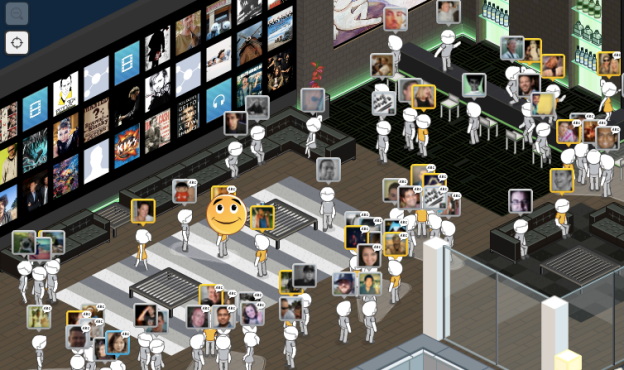 Today TechCrunch announced that the winner of its TechCrunch Disrupt conference is Shaker, a Facebook-based avatar chat room.
Today TechCrunch announced that the winner of its TechCrunch Disrupt conference is Shaker, a Facebook-based avatar chat room.
Really? Are we the only ones a little skeptical here? After reading some of the hype about Shaker we went ahead and applied to try the private beta version out. It’s basically a Facebook app that accesses a hefty host of your personal information and then transports you into a virtual nightclub scene. It’s extremely reminiscent of the more recent and outrageous SIMs–which there is also a Facebook app for.

The app is supposed to make Facebook’s social network more social. The idea is that the site isn’t actually very good at getting us to socialize: Instead we spend our alone time catching up. Now, you can chat and mingle and get your stay-in-meets-going-out on.
Our question is does anyone want to do that? Facebook addresses what we want it to pretty well. The News Feed tells us what’s been happening, Chat lets us individually communicate, Photos are a hugely popular feature, and Messages give you access to private conversations. Shaker seems trite and juvenile, and we’d imagine the people most interested in playing it are on the younger side. Why would you go to a fake bar with your Facebook friends when you could go to a real one?
We’ll give it to Shaker that more and more Facebook users are teenagers, and teenagers have proven to love these types of augmented reality games. The likes of Cityville and Farmville are evidence enough. It’s not a bad idea, it just doesn’t seem like an award-winning one. Past winners include innovative sites with impressive designs, like Qwiki, Soluto, and GetAround. These all took Web trends like search, native software, and location and tried new things with them. Facebook apps can be interesting and even lead to obsessive-like behaviors, but there’s hardly anything inventive about Shaker. We’re forced to ask what, exactly, is Shaker disrupting? An off-hand look at its competition, solutions like Cake Health and Vocre, leave us scratching our heads. Does anyone really think Shaker is the pioneer among them?
What’s really disappointing is the fact that this surfaces Michael Arrington’s controversial TechCrunch ties once again. Arrington is a “potential investor” in Shaker (and a current one in the Disrupt runner-up), and fingers are already being pointed at its undeserving win. TechCrunch writer Paul Carr tweeted: “Oh my. Erick [new editor Erick Schonfield] wrote that Mike had no input in selecting the final companies. That was untrue. See Mike’s comment.” The whole thing feels like a thinly-veiled promotion, or at the very least a major misstep.
And we’ve already uninstalled Shaker, with no plans to go back.


